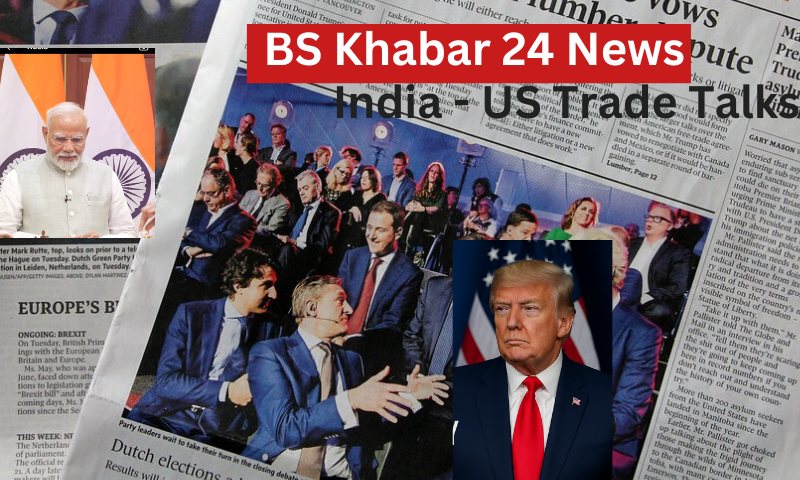Is the India-US Trade Deal in Danger? Experts Urge Caution
All eyes are currently on the changing relationship between the United States and India as the dynamics of global commerce continue to change(India-US Trade Deal). A comprehensive economic agreement between New Delhi and Washington is still elusive, despite the fact that they are two of the biggest democracies in the world and powerful geopolitical allies.
Meanwhile, President Donald Trump of the United States has once again made headlines by imposing high tariffs on some of the country’s most important trading partners, such as Mexico and the European Union. These additional duties, some of which are as high as 30%, come after earlier measures that targeted Canada, another long-standing friend. The Trump administration’s assertive posture portends a more significant change in American trade policy that may have implications around the world.India-US Trade Deal.
Tariffs Raise Concerns
President Trump’s move to levy tariffs on the European Union and Mexico has sparked concern among trade analysts. Depending on the products and nations concerned, the tariffs can range from 20% to 50%. One of the United States’ largest trading partners, the European Union, is anticipated to react, which could intensify tensions over international trade.
Remarkably, despite years of back-and-forth discussions, the United States has not yet finalised a trade agreement with India at the time of these levies(India-US Trade Deal). Although both parties have stated their intention to proceed, the specifics of the talks are still unknown.
India-US Trade Deal Talks: Progress, But No Final Deal
India and the United States are reportedly having continuous discussions on a number of important topics. Agriculture is among the most delicate topics. Indian trade experts advise caution as the United States looks to expand its access to India’s agricultural markets.
The Global Trade Research Initiative’s (GTRI) director, Ajay Srivastava, stressed the value of taking it carefully and methodically. “It is better to take precautionary measures than to rush into a deal,” he told PTI. Agriculture is a delicate industry that must not be jeopardised.
Analysts of trade agree. They contend that India should carefully consider all options and resist pressure to enter into hasty deals that can have a detrimental effect on important domestic sectors including local manufacturing, dairy, and agriculture.(India-US Trade Deal)
What’s at Stake for India?
India is currently striking a delicate balance between defending the interests of its own farmers and small businesses and opening its markets to American goods. Millions of Indians rely on agriculture for their living, making it a particularly delicate political and social issue.
Increased U.S. access to India’s agriculture sector may cause local markets to collapse, Indian farmers’ prices to drop, and sustainability and food safety issues to surface. Analysts contend that any agreement should be fair and centred on both parties’ interests for this reason.
Furthermore, India has to make sure that its interests are not overlooked in Washington’s larger economic policy given the U.S.’s aggressive pursuit of trade talks with a number of nations, including Taiwan, Vietnam, and others in Asia and Europe.
A Strategic Opportunity or a Pressure Game?
For India, the scenario offers both opportunities and risks. A fair trade agreement with the United States may, on the one hand, increase exports, draw in investment, and fortify bilateral relations. On the other hand, India might be at a disadvantage if it rushes into an agreement under duress, particularly during a time of aggressive US tariffs.
Additionally, analysts note that the Trump administration’s present trade policy appears to be more concerned with achieving immediate political advantages at home than with establishing enduring alliances. This underscores the need for India to act cautiously and ensure that the public interest remains at the centre of any arrangement.
Conclusion: Patience Over Pressure
In the complex world of global trade, patience can often be a virtue. India is wise to take its time and negotiate from a position of strength rather than urgency. The need for cautious, strategic diplomacy is further supported by President Trump’s changing trade policies, which include tariff threats even against friends.
Although a trade pact between India and the United States remains on the table, remains a possibility, it must be one that respects the needs and concerns of both countries. For India, this involves safeguarding its agricultural sector, demanding equitable terms, and maintaining a strong negotiating position. For the U.S., it’s an opportunity to demonstrate that it values true partnerships over pressure tactics.
As the talks continue behind closed doors, the world will be watching to see whether the two nations can strike a balance that supports economic growth without compromising national priorities.
